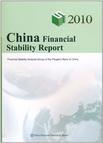中国金融稳定报告2010
2010-8
中国金融出版社
中国人民银行金融稳定分析小组 编
228
The year 2009 witnessed gradual stabilization and upturn of the global economy after the full-blown international financial crisis. Withstanding thesevere impacts of the financial crisis, the Chinese economy staged a generalrecovery. The entire financial system has been sound with positive progressmade in the reform of the financial sector, significantly enhanced strength offinancial institutions, stable operation of the financial market and improvementin financial infrastructure. At present, the global financial markets are gettingstabilized and the foundation of China's economic recovery was graduallyconsolidated. Domestic and international circumstances, however, are stillcomplicated and potential risks and uncertain factors still exist, posingchallenges for China to maintain financial stability.
Chapter I Macroeconomic DevelopmentsChapter II Banking SectorChapter III Securities and Futures SectorChapter IV Insurance SectorChapter V Financial MarketsChapter VI Financial Analysis of the Government, Corporate and Household SectorChapter VII Financial InfrastructureChapter VIII Macro-prudential ManagementSpecial Topic I An Overview of International Financial Regulatory Reform Special Topic II Reform and Development of the Rural Financial SystemSpecial Topic III China Initiates “Financial Sector Assessment Program”Appendix I A Quantitative Analysis of the Soundness of the Banking Sector: the Case of 17 Major Commercial BanksAppendix II StatisticsBoxes 1. Economic Stimulus in Major Economies 2. China's Stimulus Package 3. The Pilot Program of RMB Settlement of Cross-border Trade Transaction Proceeded Steadily 4. International Capital Flows Since the Onset of the Financial Crisis 5. China's Banking Sector Made Significant Progress in Information Disclosure 6. Analysis of Real Estate Finance in 2009 7. The Introduction of New Capital Convertible Instrument 8. The Launch of the GEB 9. Risk Monitoring System and Classified Regulation Mechanism of Securities Companies 10. Promoted the Fund Management Companies to Carry out Innovations in Business and Products 11. Micro-insurance 12. The Reform and Development of SINOSURE 13. Asset Securitization Is an Important Measure in the Development and Risk Prevention of Financial Market 14. Development of Municipal Bonds Worldwide 15. The Development and Standardization of the Local Government Investment and Financing Platforms 16. Non-financial Institutions Could Exert a Positive Role in SMEs Financing 17. Establishing a Universal High-quality Accounting Standard System 18. Impact of Systemically Important Financial Institutions on Financial Stability 19. Macro-prudential Analysis Method: Financial Network Model Based on Data from Payment and Settlement System 20. Measures Taken by Jurisdictions to Enhance Deposit Insurance during the Crisis
版权页:插图:According to Guidance to Assess the Systemic Importance of Financial Institutions, Markets and Instruments: Initial Considerations issued by IMF, FSB and BIS in 2009, systemic risk refers to a risk of disruption to financial services that is caused by an impairment of all or parts of the financial system and has the potential to have negative consequences for the real economy. New changes in the financial sector in recent years created favorable conditions for systemic risks to build-up within and spread across the financial system. These changes mainly include: continuous economic and financial globalization, closer linkage and interdependency between the financial system and real economy, significantly increasing complexity of financial products, systemic impact on the financial system arising from rapid expansion of large financial institutions, tighter interconnectedness of financial market participants, continuous strengthening of collectiveness and synchronization of financial behavior and increasing complexity of the financial system.The international financial crisis showed that systemic risks arose mainly from two dimensions: cross-section dimension and cross-time dimension. Cross-section risks refer to vulnerability of the financial system induced by interconnectedness between financial institutions, and among financial institutions, markets and infrastructure.
《中国金融稳定报告2010(英文版)》由中国金融出版社出版。
